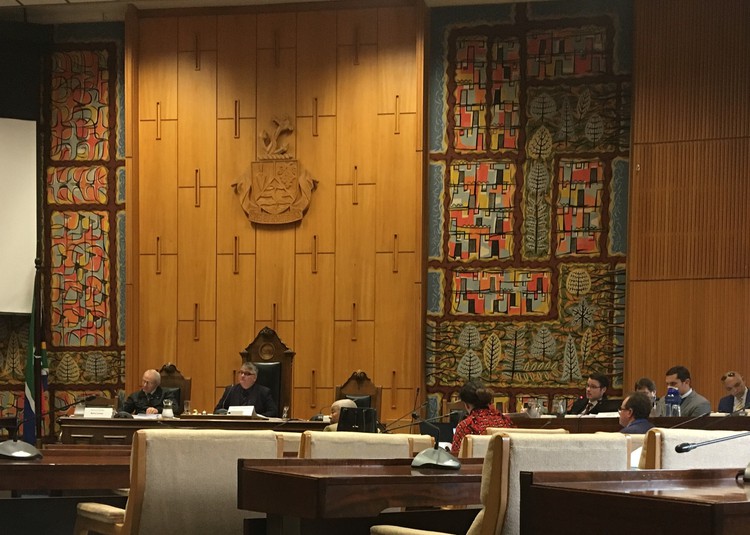Speed up affordable housing policy, say Cape Town councillors
Motion passed on Monday is a small, symbolic but important moment in the struggle for spatial justice, say housing activists
A motion to speed up the development of a clear affordable housing policy for the City of Cape Town was passed unanimously by City councillors at a sub-council meeting in Wale Street on Monday.
The motion was brought by ward councillor Dave Bryant, who noted that “it has become clear that there is a need for more clarity on the way that affordable housing can be promoted”. He said that a clear policy would help guide the Municipal Planning Tribunal in its decisions about affordable housing developments in the City.
“The City’s Strategic Policy Unit (SPU) is working on something with the TDA (Transport and Urban Development Authority), but our sub-council wants to see it and have the process sped up,” said Bryant.
Bryant recommended that the TDA give the sub-council a presentation on their progress on affordable and social housing policy in August. He explained to GroundUp that it will thereafter go for public participation and could then be ratified.
“I welcome the motion and the support from the sub-council,” said councillor Brett Herron, the mayoral committee member responsible for the TDA. “A lot of work has already been done on this and we are making good progress.”
Herron said the TDA’s objective is to have private developers either provide some affordable units within their developments or make “off-site contributions” to affordable housing. This is what the City calls inclusionary housing.
Councillor Brandon Golding, ward councillor for ward 77, which includes Bo-Kaap, said that the former military base on erf 81 that lies between Bo-Kaap and Tamboerskloof represents a good opportunity for social housing in the city.
“If we are going to tackle this [issue] in any meaningful sense, it’s not going to be 150 metres which we find on the arbitrary parking lot,” said Golding. “It’s the 12 hectares of land which sits between Bo-Kaap and Tamboerskloof.”
Golding said he hoped the City’s policy would make negotiations with national government over erf 81 easier, “so we can expedite inclusionary housing within the city”.
Julian Sendin, a researcher at housing activist group Ndifuna Ukwazi — which attended the meeting — said although erf 81 is ideal for a large development including a large portion of affordable housing, “we must be careful of the City using it as a diversion”.
“If the City had developed more of its inner-city land into social housing, it would be in a better position to ask national government to transfer erf 81 to them,” said Sendin.
Sendin said that while Monday’s motion was encouraging, “The perfect policy does not exist.”
“The City can’t wait years for this policy while it grants development rights to spatially unjust building across the metro,” said Sendin. “What we need is something in the interim … We cannot allow exclusive developments to get away with business as usual. The situation is urgent.”
Lindiwe Beyi lives in the former Helen Bowden Nurses Home. Last year Ndifuna Ukwazi led a mass occupation of this property. She attended the sub-council meeting and was happy the motion was passed. “It’s a small step, but it’s a step in the right direction, so it’s getting us somewhere,” said Beyi. “We are looking forward to seeing the actual policy.”
“This is a small, symbolic but important moment in the struggle for spatial justice,” said Ndifuna Ukwazi in a statement released on Monday. “City councillors now have an opportunity to show leadership and proactively pass an inclusionary housing policy that will transform how we use public and private land.”
What is meant by affordable housing?
The City’s Municipal Spatial Development Framework defines affordable housing as:
“Household income brackets of R3,501 – R18,000 per month, and is inclusive of social, GAP, and inclusionary housing. It also refers to residential units valued at R500 000 or less.”
Support independent journalism
Donate using Payfast

Next: Slow progress towards opening Cape Town refugee office
Previous: Food delivery men say they’re exploited
Letters
Dear Editor
It is a great irony of course, interviewing Brett Herron and Golding and Byrant etc, about inclusive housing, specifically in Bo-Kaap, when it could be said that Bo-Kaap already is inclusive. It is the council's absolute dragging-of-heels/ effective refusal to declare Bo-Kaap a Heritage Zone that is driving poorer people out of the area!
© 2018 GroundUp.
This article is licensed under a Creative Commons Attribution-NoDerivatives 4.0 International License.
You may republish this article, so long as you credit the authors and GroundUp, and do not change the text. Please include a link back to the original article.

